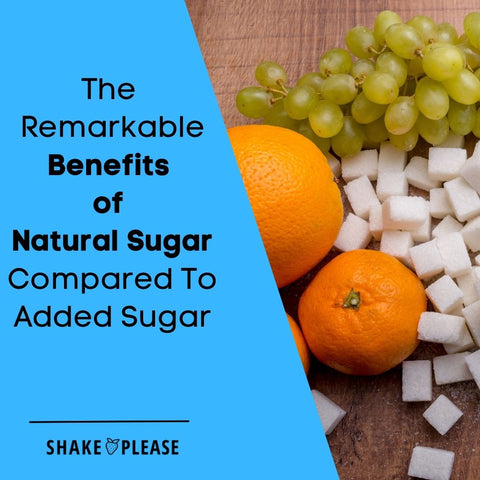Unveiling the Sweet Truth: Natural Sugar vs. Added Sugar

In the quest for a healthier lifestyle, the clash between natural sugar and added sugar takes center stage.
Sugar, in its various forms, has long been a staple in our diets.
However, not all sugars are created equal. Natural sugar, found in whole foods like fruits and vegetables, offers a wealth of benefits that extend beyond mere sweetness.
Join us as we explore the remarkable benefits of natural sugar and discover how it can elevate our health and wellbeing.
Fruit Sugar vs Added Sugar
When it comes to the ongoing debate between fruit sugar and added sugar, the scales decidedly tip in favor of the naturally occurring sweetness found in fruits. Unlike added sugars, which can often be lurking in processed foods and sugary beverages, the sugars present in fruits come bundled with a treasure trove of health-enhancing benefits.
Fruits provide a spectrum of essential vitamins, minerals, antioxidants, and dietary fiber that contribute to overall wellbeing.
What's more, blending fruits into a medium such as a smoothie amplifies their nutritional impact, creating a convenient and delightful way to indulge in their natural goodness. Smoothies offer a brilliant avenue to incorporate a variety of fruits, each lending its unique flavor and nutritional profile to the mix. By opting for whole fruits and blending them into delicious concoctions, we harness the power of nature's sweetness while sidestepping the pitfalls of added sugars.
So, whether you're sipping on a vibrant berry blend or enjoying a tropical fruit medley, remember that your choice to embrace fruit sugars in the form of a nutrient-packed smoothie is a step toward nourishing your body and savoring the authentic taste of nature's finest offerings.
Total Sugar vs Added Sugar
When we look at the information on food labels, we can see two kinds of sugar: total sugar and added sugar.
Total sugar encompasses both naturally occurring sugars, such as those found in fruits and dairy products, as well as added sugars that manufacturers introduce during processing. Understanding the difference is important for making informed dietary choices.
While natural sugars come hand in hand with essential nutrients like vitamins, minerals, and fiber, added sugars often contribute empty calories devoid of nutritional value.
By prioritizing foods with lower added sugar content, you pave the way for a diet that's not only flavorful but also aligned with your health and wellness goals.
A Healthy Choice: Fruit and Berry Protein Smoothies with Natural Sugar
When it comes to harnessing the benefits of natural sugar, protein smoothies offer a delicious and convenient option. Combining the richness of protein with the sweetness of fruits and berries creates a nutritional powerhouse that fuels your body and tantalizes your taste buds.
A protein smoothie packed with fruits and berries provides a delightful blend of vitamins, minerals, and antioxidants. These elements work together to support muscle recovery, boost energy levels, and promote skin health. Plus, the natural sugars from the fruits deliver an invigorating dose of energy without the drawbacks of added sugars.
Health Benefits of Natural Sugar
The advantages of consuming natural sugar are abundant. Firstly, the presence of fiber in whole fruits and vegetables helps slow down the absorption of sugar, preventing sudden spikes and crashes in blood sugar levels. This steady release of energy supports sustained physical activity and mental focus throughout the day.
Additionally, the vitamins and minerals found alongside natural sugar contribute to a strengthened immune system, enhanced cellular function, and radiant skin. These nutrients work in harmony to promote overall wellness and vitality.
What is added sugar?
Added sugar, on the other hand, refers to sugar that is added to food and beverages during processing or preparation. It's the sweetener that manufacturers add to enhance the taste of their products. Unlike naturally occurring sugar, added sugar doesn't offer any nutritional benefits and is often referred to as empty calories.
Common sources of added sugar include soft drinks, candy, pastries, and many packaged foods.
TRY OUR DELICIOUS AND CREAMY MIXED BERRY SMOOTHIE WITHOUT BANANA RECIPE
Why is it important to differentiate between sugar and added sugar?
Understanding the distinction between sugar and added sugar is crucial because it allows us to make informed choices about our food and beverage consumption.
While sugar found naturally in foods like fruits and vegetables is accompanied by other essential nutrients, added sugar offers no nutritional value other than taste.
The Sweet Alternatives: Exploring Natural Sweeteners
For those seeking alternatives to refined sugar, natural sweeteners like honey, maple syrup, and stevia offer a way to satisfy your sweet tooth. However, moderation remains key, as excessive consumption of any sweetener can have negative effects.
Frequently Asked Questions (FAQs)
Q1: Can natural sugar be part of a weight management plan? A1: Absolutely! The fiber and nutrients in natural sugar contribute to a feeling of fullness, making it a valuable component of a balanced diet.
Q2: How can I incorporate more natural sugar into my diet? A2: Enjoy a variety of fruits, vegetables, and whole grains to naturally increase your intake of beneficial natural sugars. Additionally, crafting nutrient-packed smoothies with these wholesome ingredients presents a delicious opportunity to embrace the benefits of natural sugars.
Q3: Are protein smoothies a good way to consume natural sugars? A3: Yes, protein smoothies that include fruits and berries offer a nutritious and flavorful way to enjoy the benefits of natural sugar, while also providing essential protein for muscle support.
Q4: What's the difference between natural sugar and added sugar? A4: Natural sugar comes from whole foods such as fruits and is accompanied by nutrients, while added sugar is introduced during processing and offers little nutritional value.
Q5: Can natural sugar be enjoyed by individuals with diabetes? A5: Monitoring portion sizes and managing carbohydrate intake is key for individuals with diabetes. Consult a healthcare professional for personalized guidance.
FUEL YOUR DAY: PROTEIN-PACKED BREAKFAST IDEAS
Conclusion
In the realm of sugars, the choice is clear. Natural sugar, generously provided by nature herself, brings a wealth of benefits to the table.
From sustained energy to enhanced immunity, the marvels of natural sugar underscore the importance of embracing a wholesome and balanced diet.
By embracing the benefits of natural sugar, we redefine our relationship with sweetness and take a crucial step towards a balanced and vibrant life which is in sharp contrast with added sugar.





